revhtree
Owner Administrator
View Badges
Staff member
Super Moderator
Reef Squad
Partner Member 2024
Excellence Award
RGB
Photo of the Month
Article Contributor
R2R TV Featured
Hospitality Award
Article Administrator
Black Friday Sponsor
Partner Sponsor 2023
Industry Professional
My Aquarium Showcase
- Joined
- May 8, 2006
- Messages
- 47,740
- Reaction score
- 86,931
Have any of you considered going solar for just your reef tank? Is this something that is even feasible? I must admit I have zero knowledge about this topic so educate me!
Also how much energy is your tank consuming monthly?

Also how much energy is your tank consuming monthly?


















